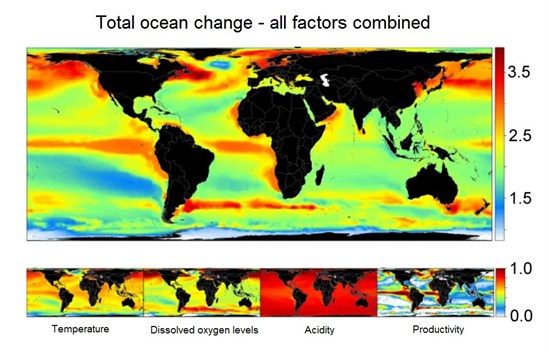Freya Roberts
18.10.2013 | 2:30pmHumans’ greenhouse gas emissions are changing the oceans’ chemical makeup – posing risks to wildlife and coastal communities. That’s the conclusion of a new study which says every part of the ocean’s surface will feel the effects of climate change by the end of the century.
Last month the IPCC’s major climate science report warned the oceans were already warming, becoming more acidic and less productive – changes an international team of ocean scientists have described as a ” deadly ocean trio“.
Chemical changes
Probably the best-known effect of climate change on the oceans is sea level rise. But scientists are tracking a variety of ways that the oceans are changing.
As a result of humans’ rising carbon emissions, the oceans are also warming. The Intergovernmental Panel on Climate Change (IPCC) estimates that since the 1970s, oceans have taken up more than 90 per cent of the heat trapped by greenhouse gases. Temperatures have risen both at the surface and in the deep ocean.
Less obviously perhaps, the oceans are also becoming more acidic. When carbon dioxide is absorbed into the ocean it reacts with water to produce carbonic acid. The IPCC estimates that the oceans have absorbed 30 per cent of humans’ carbon dioxide emissions since 1750.
The amount of oxygen dissolved in seawater is also declining as a result of climate change. The availability of oxygen is key to the survival of marine life – there’s a good discussion here. Without enough oxygen, plants and animals living in the oceans will struggle to grow and reproduce – limiting what scientists call ‘ocean productivity’.
Warm, acid waters
Based on the latest generation of climate models used by the IPCC, new research predicts that no part of the oceans will be untouched by one or more of these changes by the year 2100.
The study suggests that the top layer of the ocean will warm by between 1.2 and 2.6 degrees Celsius by 2100, depending on whether greenhouse gas emissions are cut back or continue to rise. The amount of oxygen dissolved in those waters is predicted to decline two to four per cent on current levels, and ocean productivity to be 4 to 10 per cent lower than at present.
Many of these predictions echo what the IPCC report said at the end of last month – perhaps not surprising, as they are based on the same models.
Take ocean acidification for example, which is measured on a pH scale where smaller numbers represent greater acidity. Both the new study and the IPCC predict the ocean pH will fall 0.15 pH units by the end of the century under a low emissions scenario, and 0.31 under a high emissions scenario.
What the new study adds is an assessment of where multiple changes will overlap. The authors mapped out the scale of each change individually. They then summed up the degree of change in each measure of ocean health – temperature, oxygen levels, acidity and productivity – to work out where the greatest simultaneous changes were taking place:

On the lower scale, zero means absolutely no change, and one means the most extreme value predicted worldwide. The upper scale reflects the sum contribution from the four individual components of ocean change. Source: adapted from Mora et al (2013)
Knowing where multiple changes will overlap gives an indication of which areas of the ocean will change most.
Which species will be affected?
With maps like these, the team were able to identify hotspots – areas rich with wildlife where significant ocean changes are expected to take place.
Lead author of the study, Camilo Mora, explained:
“The consequences of these co-occurring changes are massive – everything from species survival, to abundance, to range size, to body size, to species richness, to ecosystem functioning are affected by changes in ocean biogeochemistry.”
Their results suggest that areas which are home to cetacean species such as dolphins and whales would be severely exposed to the changes, as well as locations where pinniped species like seals and walruses live. Shallow water habitats where corals and seagrasses exist could also see big changes, their models suggest.
Effects on human society
The authors also tried to model how many people these overlapping changes could affect.
Assuming carbon emissions stabilise by the end of the century, their calculations suggest 470 million people on low incomes, who are heavily reliant on the ocean to meet their basic needs, will be exposed to medium or high levels of ocean change. Include slightly wealthier people who rely heavily on the ocean for things like tourism, and that number rises to 690 million. The numbers are higher – up to one billion people are affected – if models assume emissions rise unabated this century.
The figures highlight how many people are vulnerable to the changes now widely predicted by ocean scientists. The poorest people in society often have the least ability to adapt to change. Being highly reliant on the oceans for food, income and livelihoods also means these people could stand to lose the most when change occurs.
These modelling exercises give a good indication of the scale of the issue, but there are some errors associated with combining climate models projections with different data sets on population and income. So how things actually change may vary from the scenarios described.
Multiple warnings
Studies like these demonstrate humans’ impact on the oceans goes much further than simply causing sea levels to rise. Scientists are confident climate change is already altering the ocean’s chemical makeup – in ways that are set to continue in the future.
The IPCC highlighted these changes in its scientific report last month, and other studies by international teams of scientists have since followed suit. Expect more on the human consequences of those changes when the second part of the IPCC report comes out next March.

